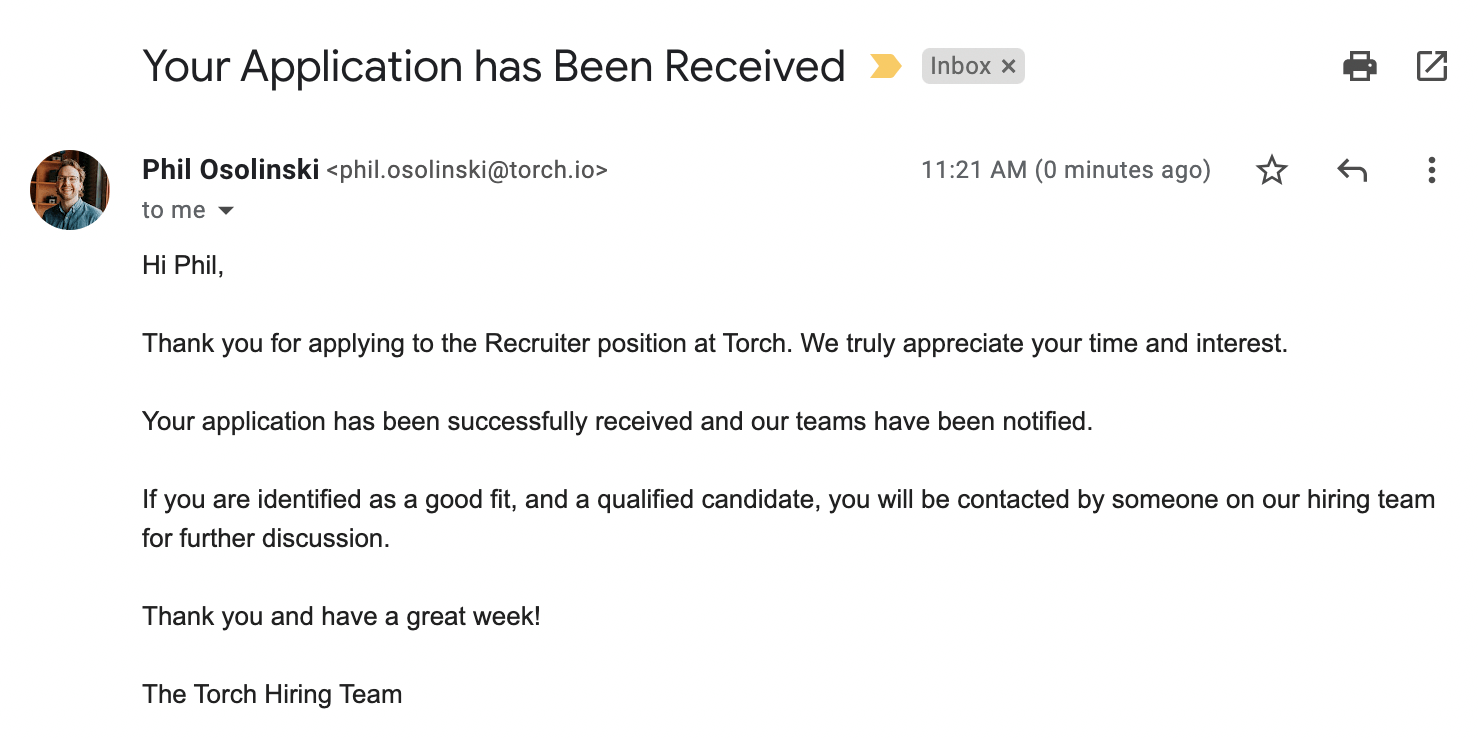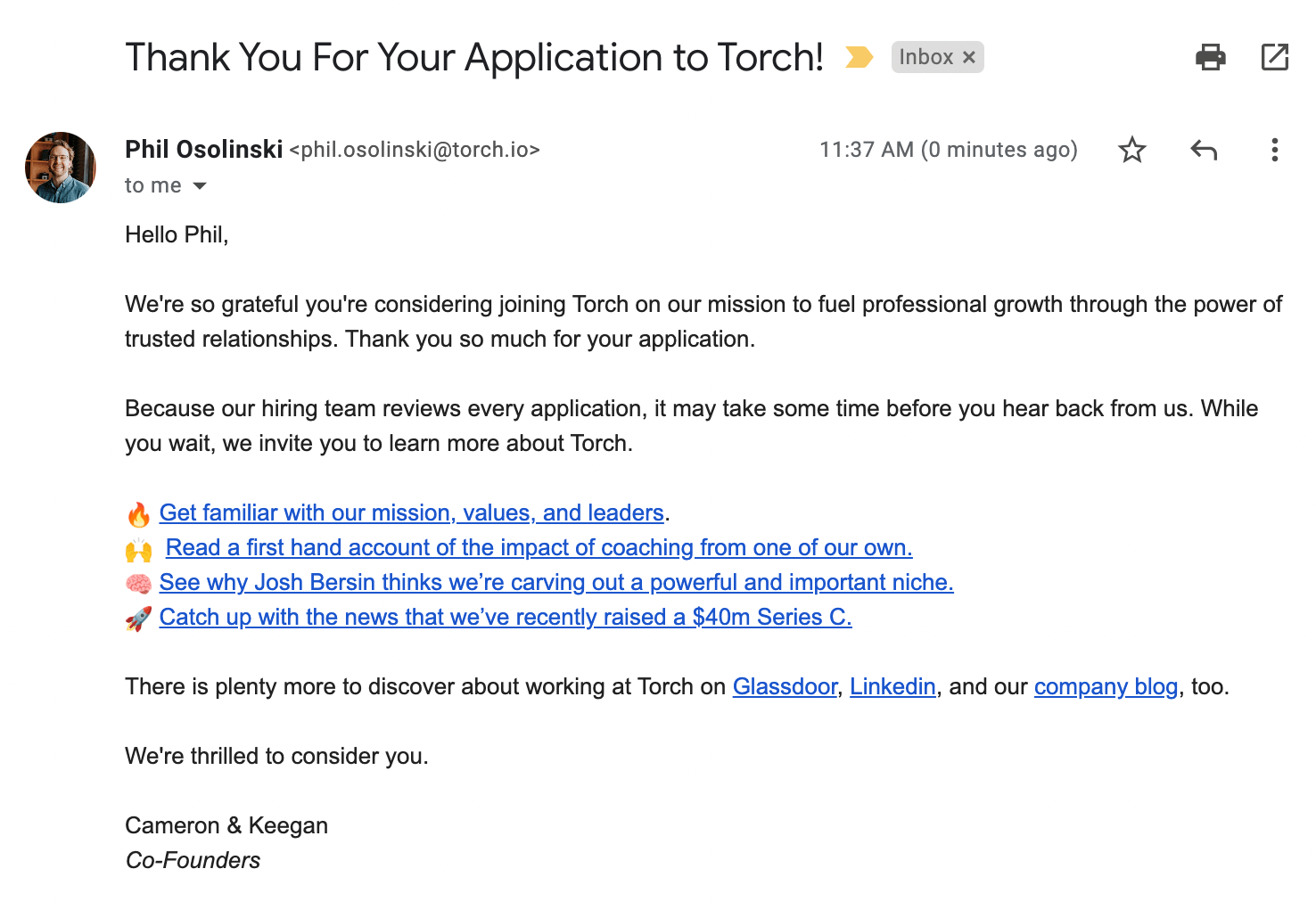In the hustle and bustle of scaling a company, hitting headcount deadlines, and keeping up with an email inbox that has no end, it can be easy for us recruiters to forget about how important the personal touch can be for candidates going through an interview process.
I’ve played a role in building the early teams at a number of startups. I’ve seen that the high touch, personal tactics that work to make the first ten hires simply don’t scale when you’re at a later stage company that’s making ten hires each month. As much as we’d all like to deliver a high level of service, instant communication, and seamless scheduling to our candidates, it’s often just not possible.
That said, there are some things I’ve learned over the years that may be helpful for fellow recruiters out there who are tasked with moving a high volume of candidates through a pipeline while also delivering a high quality candidate experience. Here I’ll share three small changes you can make today to humanize your interview process at scale and balance those competing mandates at least a little bit more.
Why Humanizing Recruiting Matters
Your interview process is indicative of a lot. The questions you ask, the responsiveness of your hiring team, and how organized the process is shows candidates what your company actually values and if you even have the basic block and tackling of hiring and people success figured out.
In my work, I orient the interview processes I’m responsible for building and running around three key things. I want candidates to feel respected, to be informed, and to gain excitement.
The tips I’ll share directly influence at least one of these targeted outcomes. This matters to you as a recruiter if you want to build a strong talent brand for your company, to drive referrals from people who interview with your company, to have folks grow and apply again in the future when they may be better fits, and to keep candidates engaged and interested throughout the process.
With that, let’s dive in.
3 Tips for Humanizing the Interview Process
1. Upgrade your application confirmation email.
The standard application confirmation email looks something like this:

It’s bland. It doesn’t really say much. It’s from a team and therefore no one in particular. It accomplishes its job of confirming to the candidate that their information was received, but it is also an opportunity for so much more.
Don’t miss out on making a high impact first impression with your candidates. Automated emails such as the one confirming an application has been received are a great opportunity to set the tone for what your company values and how you put those values into practice.
Here’s how this looks for us now:

Here’s what I did (and what you can do to) to make the email more exciting and human:
-
Start by saying thanks in the subject of the email. We’re truly grateful and appreciate every application we receive. If you are too, this is a great way to show it.
-
State the mission upfront in a way that’s easy to understand. If you’re reading this, you’re likely driven by purpose and appreciate working with others who also are. Share that purpose!
-
Set expectations around the early process and when candidates will hear back. We can’t be exact with timing for a number of reasons, but we can show that we care and will in fact review every application.
-
Share links to make researching the company easy on the candidate so they don’t have to do all this legwork themselves.
-
Sign off the email with actual people, in this case the co-founders of the company, Cameron and Keegan, who helped write this email. This is my favorite way to enhance any communication with a personal touch.
This example shows how a few basic changes to an otherwise mundane step in the process can make an immediate difference. And just think for yourself, if you were a candidate and you received the two examples above from different companies, which would you feel more welcomed by? Which would you prefer to interview with? Which would you be more excited to interview with?
2. Be transparent on timing.
You may have noticed that in the email above, we don’t share a specific timeframe for when a candidate should expect to hear from us.
As a recruiter, you know that it can often be quite unpredictable and vary greatly depending on the priority of the role, your workload, how many candidates apply, if you’re sick or on PTO, and many other factors. We don’t want to make a promise upfront and not deliver on it.
As soon as you are able to interview a candidate, however, you should have a decent understanding of how the process is progressing and where other candidates are relative to the person you’re interviewing.
I’ve always found it helpful to share this information with candidates. For example:
-
If we’re early in the process and things are progressing slowly or we’re not going to make an offer for the role for another month, I’ll share that.
-
If we’re late in the process and we may be offering a later stage candidate soon, I’ll share that.
-
If we’re hiring for a high priority role and looking to move people through the process as quickly as possible, I’ll share that.
I find that volunteering this information near the end of initial interviews is helpful and appreciated by candidates. It also invites candidates to share what their timeline may be. As a recruiter, this gives you the opportunity to do your diligence on aligning expectations so no time is wasted and both sides can feel respected and heard.

3. Say thank you.
Don’t just say thank you – give a thank you with meaning. Recruiting success results from great candidates being generous with their time, interest and energy. For that, we should all be extremely grateful.
Personally, I jump at every opportunity to say thank you, like in the application confirmation email from above, and I make it a point to end each interview I conduct with a genuine thanks. If you don’t already make a point to do this, I strongly recommend you do.
Thank your candidates for their time. There are plenty of other things anyone could be doing besides interviewing. We’re all busy after all.
Thank your candidates for their interest. They’ve chosen to apply to your company for a reason, and as a startup that interest is special. We’re not all like Airbnb getting 800,000 career site visits a month.
Thank them for their energy. Applying for jobs and interviewing can be exhausting and drain both mental and physical energy. A thirty-minute interview can sometimes feel like a workout in itself.
Plus, it feels good to recognize your own gratitude throughout the work day and show this appreciation towards others.
Closing
I know recruiting can be hard, especially for those of us who are people pleasers wanting everyone we work with to feel good about their interactions with us and our company. Though it gets tougher to scale that personal touch as your recruiting mandate grows, these three tips can be the spark that helps you design a more personal, human centric recruiting process.
Is there anything else you do that makes your interview process more human? I would love to hear about it! Please feel free to DM me in the Purpose Jobs Slack community with your thoughts and ideas.
And thank you so much for reading.
About the Author
 Phil Osolinski is a recruiter at Torch, a Series C startup that provides leadership coaching, mentorship, and online learning to companies ranging in size from small startups to generation-defining enterprises like Airbnb, Coinbase, and Linkedin. At Torch, he currently leads recruiting for sales and customer success positions. Prior to Torch, Phil was a freelance talent partner specializing in helping venture backed startups build their early teams. He was also the founder and CEO of a fintech startup for nearly four years. He’s a graduate of Butler University in Indianapolis and now lives just north of Columbus, OH where he finds himself playing lacrosse whenever he can find the time.
Phil Osolinski is a recruiter at Torch, a Series C startup that provides leadership coaching, mentorship, and online learning to companies ranging in size from small startups to generation-defining enterprises like Airbnb, Coinbase, and Linkedin. At Torch, he currently leads recruiting for sales and customer success positions. Prior to Torch, Phil was a freelance talent partner specializing in helping venture backed startups build their early teams. He was also the founder and CEO of a fintech startup for nearly four years. He’s a graduate of Butler University in Indianapolis and now lives just north of Columbus, OH where he finds himself playing lacrosse whenever he can find the time.




.png?width=50&name=Erin%20Gregory%20(1).png)


